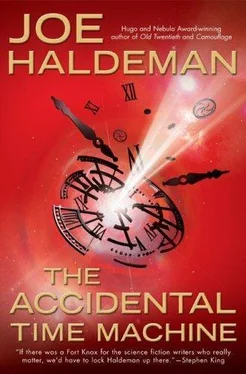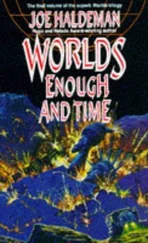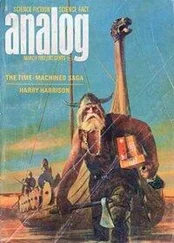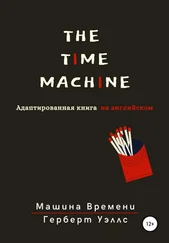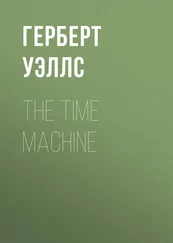“I think I love you, which is a better deal than I would have gotten at home. And really, in the time we’ve known each other, these few million years, we’ve done more together than most married couples ever do.”
He chuckled. “That’s true. Been more places, had more adventures.”
“Except the one.”
He stopped walking and looked her in the face. “I wonder how much a marriage license costs. I wonder whether we could get one today.”
Matt got a hundred-dollar bill for the Lincoln note that had cost him ten thousand in 2079. He bought nice wedding rings for both of them, and had enough left over to buy some decent clothes and a fine dinner at the Union Oyster House, which they both remembered from their respective futures.
Matt was surprised to find that he enjoyed being a janitor, the slow and steady predictableness of it. But he wasn’t a janitor long. He took evening classes for one year, and of course drew attention.
The Lowell Institute funded free evening “lessons” in various science and engineering disciplines, and mathematics. His teachers in mathematics and physical science were amazed at the erudition of this autodidact from Ohio.
In Matt’s second year, he was hired by Lowell as a night instructor in algebra and calculus. They also gave him a stipend so he could quit his day job and pursue a degree.
Of course he had a huge unfair advantage over other students. He had the “foresight” to study German intensively, and when in 1900 Max Planck published Über eine Verbesserung der Wienschen Spektralgleichun , the paper that eventually led to quantum mechanics, Matt was the first person at MIT to read it and explain it to others. In 1901, he earned his first physics degree, and his second in 1902. MIT sent him to Harvard to get his doctorate so they could ask him back to teach (even then, there was a tradition against an institution hiring its own new Ph.Ds). At Harvard he pored through Annalen der Physik and was the first to note the importance of Einstein’s four papers in 1905, including Zur Elektrodynamik bewegter Körper , which changed the world forever and gave Matt an impressive doctoral dissertation.
This was indicative of his life’s strategy. He could have beaten Einstein to the punch; as an undergraduate in 2050 he had been required to go to the whiteboard and derive the Special Theory of Relativity from first principles. But he couldn’t afford to become famous. People would be curious about his past, and find out that he had none.
Martha went to night school as well, working days as a chambermaid in the Parker House Hotel, and eventually got a degree in general science. Her accomplishment was more impressive than Matt’s, though only Matt knew why. She worked as an insurance analyst for two years, then had the first of their four children, and retired.
In 1915, the last year before MIT moved across the river, Matt made full professor. The next year, while the physics department was settling into the mudflats of Cambridge, Matt read Einstein’s Die Grundlage der allgemeinen Relativitätstheorie , the Annalen article where he first described General Relativity. Of course, everyone had his eye on Einstein by then, but to most scientists the mathematics behind General Relativity was new and difficult. Not so to Matt; he’d had tensor calculus in 2051, and boned up on it in 1916, before the paper came out.
He was one of the most popular professors at MIT, for the students, though he was a puzzle to the faculty. He published papers with acceptable frequency, but they were “solid” work rather than brilliant—whereas in person he often was brilliant, making connections that no one else saw. In conversation he was years ahead of his time; in publication he was not. Carefully not.
Their marriage was so conspicuously happy that even their own children were impressed. It seemed as if all of life was amusing to them. Of course, no one knew that they were a conspiracy of two. Perhaps all great loves are that: a secret that can’t be shared.
Among his mathematical skills was arithmetic. He knew that his mother would be born in 1995, and so there was no chance that he would live long enough to go to Ohio and see her as an infant. Perhaps that was a good thing.
Matt lost Martha in 1952, when she was seventy-four. A professor emeritus at eighty-one, on his way back from the funeral he saw the headlines about the H-bomb the U.S. had exploded in the South Pacific. He went to his office that day, and as a way of dealing with grief he tried to spread hope: This is not the end of the world. The world is big and resilient.
To his own surprise, he lived another seventeen years. In his final hours, he watched the ghostly images of men jumping around on the Moon. His last words were enigmatic: “I’ve been there, you know. It’s much like Earth.”
His story doesn’t quite end there. The year after Martha died, he had hardly noticed when his seventeenth great-grandchild was born, a girl named Emily. She married Isaac Marsh in 1975, and in 1999 they had a son, Jonathan.
In 2072, Jonathan Marsh would be given the Nobel Prize in physics, for discovering a curious kind of time travel.
Back in 1971, when I started writing The Forever War , I needed a way to get soldiers from star to star within a human lifetime, without doing too much violence to special and general relativity. I waved my arms around really hard and came up with the “collapsar jump”—at the time, collapsar was an alternate term for “black hole,” though I was unaware of the latter term. (Scientists now use “collapsar” in referring to a specific kind of massive rotating black hole.)
Years later, working from actual science rather than a novel’s plot requirements, physicist Kip Thorne came up with his “wormhole” theory that did the same thing, to my delight. I never thought it could happen again, but with this novel it did.
Casting about for some reasonably scientific mumbo jumbo to use for a time machine, I settled on gravitons and string theory. Nobody has ever seen a graviton, so I was pretty much home free on that, and normal people can’t understand string theory, so that was fair game, too.
When I was about halfway through the novel, though, an article in New Scientist pointed me to a paper by Heinrich Päs and Sandip Pakvasa of the University of Hawaii, and Vanderbilt’s Thomas Weiler, “Closed Timelike Curves in Asymmetrically Warped Brane Universes,” which indeed uses gravitons and string theory to describe a time machine. My jaw dropped.
It’s a truism of science fiction that if you predict enough things, a few of them are going to come true. But this particular phenomenon seems to be of a different order. It’s not that I have any special scientific credentials, just an old B.S. in physics and astronomy. What I think it actually demonstrates is that if you wave your arms around hard enough, sometimes you can fly.
